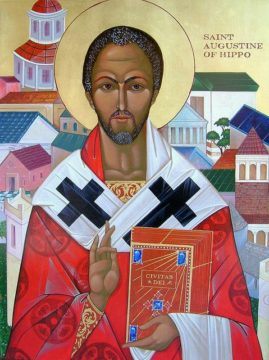Daniel José Camacho at The Point:
 I learned about Augustine of Hippo from my mother. She had memorized lines from his Confessions as a Catholic schoolgirl in the Caribbean village of Manatí in Colombia. “Our hearts are restless until they rest in God,” she would tell me. Even after she immigrated to the United States and became a born-again Protestant, she kept reciting him. When I left my home on Long Island to study philosophy at a liberal arts college out of state, her prayers followed me just as Monica’s trailed her son, Augustine, when he boarded a ship heading for Italy. I joked that she was my Monica. But I gradually developed my own relationship to Augustine. As I encountered him in a predominantly white academic setting, I latched on to him. He became more than the metaphysical or doctrinal positions parsed in class. Augustine was the symbol of a more diverse and global Christianity that had been covered up by white-supremacist lies. “The greatest thinkers of the early Church came from Africa!” I declared to amused peers. My Augustine was Black.
I learned about Augustine of Hippo from my mother. She had memorized lines from his Confessions as a Catholic schoolgirl in the Caribbean village of Manatí in Colombia. “Our hearts are restless until they rest in God,” she would tell me. Even after she immigrated to the United States and became a born-again Protestant, she kept reciting him. When I left my home on Long Island to study philosophy at a liberal arts college out of state, her prayers followed me just as Monica’s trailed her son, Augustine, when he boarded a ship heading for Italy. I joked that she was my Monica. But I gradually developed my own relationship to Augustine. As I encountered him in a predominantly white academic setting, I latched on to him. He became more than the metaphysical or doctrinal positions parsed in class. Augustine was the symbol of a more diverse and global Christianity that had been covered up by white-supremacist lies. “The greatest thinkers of the early Church came from Africa!” I declared to amused peers. My Augustine was Black.
more here.
